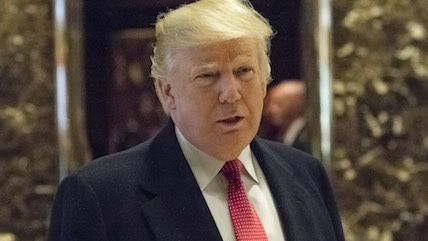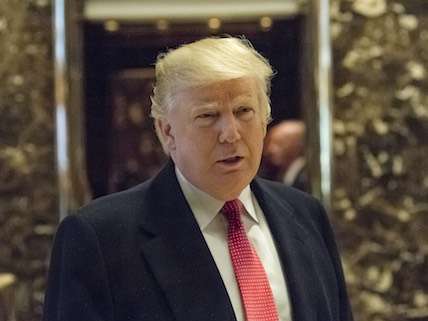4 Ways the Trump Administration Could Help Minorities
Pardon non-violent drug offenders, repeal minimum wage


Republicans running for president haven't done very well with minority voters, and although President-elect Donald Trump fared slightly better this year than Mitt Romney did in 2012, the numbers still show that the GOP has a long way to go to make inroads with black and Hispanic voters. According to the Pew Research Center, Trump received only 8 percent of the black vote and 28 percent of the Hispanic vote. With demographic trends projecting that the share of non-Hispanic whites will continue to drop, it would be wise for the incoming Trump administration to pursue sound policies that have the additional benefit of helping minorities.
First, support the decriminalization of drug possession and the complete legalization of marijuana. Like alcohol prohibition, the federal government's war on drugs has been a costly failure. In 2015, only 16 percent of drug arrests were for manufacturing and sale; the clear majority were for mere possession.
Drug usage rates are similar between whites and minorities, with blacks representing about 14 percent of regular drug users. But blacks account for 37 percent of drug arrests. Marijuana, which is arguably safer than alcohol, account for almost 43 percent of drug arrests, and of those, 90 percent are for marijuana possession. Again, even though usage across the races is similar, blacks are almost four times as likely to be arrested for marijuana as whites.
Second, pardon all nonviolent drug offenders in federal prisons. A whopping half of those in federal incarceration are there for drug offenses, and a disproportionate share of the federal prison population is nonwhite. According to The Sentencing Project, African-Americans serve almost the same amount of time in prison for drug offenses as whites do for violent offenses. Indeed, the federal government's draconian drug policies have led to the highest incarceration rate in the world. The United States has 5 percent of the world's population but 25 percent of the world's incarcerated population. In addition to being wildly expensive to taxpayers, the mass incarceration of drug offenders has destroyed families and ruined the job prospects of young minorities.
Third, eliminate the federal minimum wage. Minimum wage laws are intended to help put more money in the pockets of workers, but the unintended consequences of these laws on minorities are problematic. Government-imposed wage floors artificially inflate the cost of labor. Businesses might respond by seeking cost reductions in other areas. For workers, that could translate into fewer hours, reduced benefits and even termination. For example, raising the minimum wage to $15 an hour wouldn't help a worker if his company decided it would be more economical to replace the worker with an automated kiosk. Lower-skilled workers, who are likelier to be minorities, are the first on the chopping block when labor costs are higher than what the market can bear.
Fourth, target federal regulations that inhibit job creation. It's interesting that many of those advocating a higher federal minimum wage are often the same people in favor of the federal government's piling regulation after regulation onto businesses. Like the federal minimum, artificially higher costs resulting from regulations cause businesses to seek savings elsewhere, including cutting the labor force or, worse, closing the doors. According to my colleagues at the Mercatus Center, if federal "regulation had been held constant at levels observed in 1980, the U.S. economy would have been about 25 percent larger than it actually was as of 2012. … This amounts to a loss of approximately $13,000 per capita, a significant amount of money for most American workers."
I have listed four ways the incoming Trump administration could help minorities, but there are more. And while these policy prescriptions would be of particular help to blacks and nonwhite Hispanics, they would benefit all Americans—men and women, young and old, rich and poor—well, perhaps not those in the prison business or the government employees responsible for drafting the reams of regulations.
COPYRIGHT 2016 CREATORS.COM
